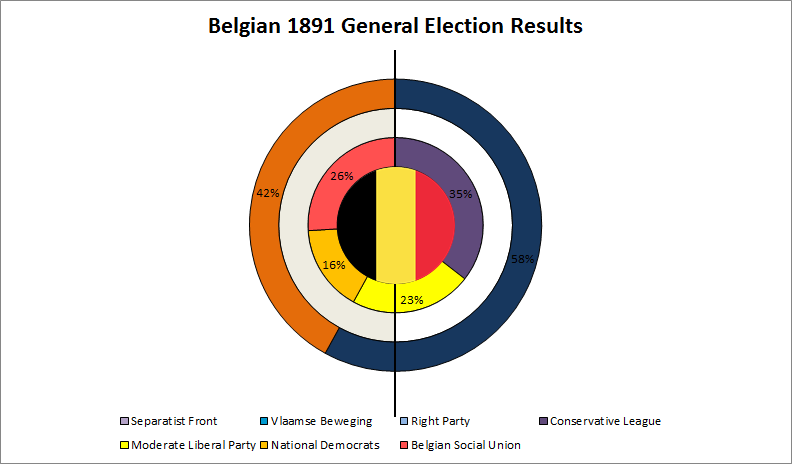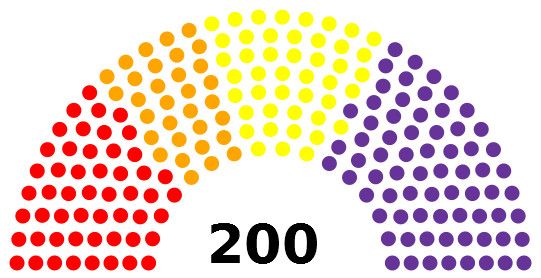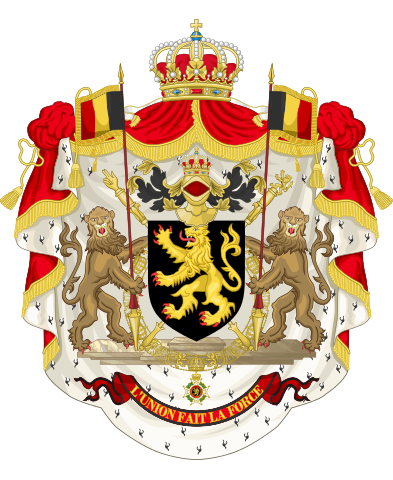((It should be the Flemish one, I guess?))((Um... King, I think you're voting in the wrong election...))
Edge of Europe - A Belgian Interactive AAR
- Thread starter ThunderHawk3
- Start date
-
We have updated our Community Code of Conduct. Please read through the new rules for the forum that are an integral part of Paradox Interactive’s User Agreement.
You are using an out of date browser. It may not display this or other websites correctly.
You should upgrade or use an alternative browser.
You should upgrade or use an alternative browser.
((Um... King, I think you're voting in the wrong election...))
((My apologies, fixed.))
((Tally thus far. We're moving along at a pretty good clip, with 27 people having already voted. Various bilateral coalitions are possible; the incumbent coalition seems unlikely without restructuring but would hold a firm majority. Wallonia and Brussels ministerial races are both tied (accounting for 2nd choice votes in the latter) and De Leeuw is edging out Vanderhoof in Flanders.))
[extrapolated seat totals in brackets]
GLP: 7 [52 - 26%]
RU: 10 [74 - 37%]
BSU: 7 [52 - 26%]
NDP: 3 [22 - 11%]
Total: 27
Wallonia:
Blaise Sauveterre: 3
Johann Wolff: 3
Flanders:
Andrei Popa Vanderhoof: 6
Josef De Leeuw: 7
Brussels:
Lambin l'Escargot: 3
Dirk Hendrickx: 2
Poisson: 1
[extrapolated seat totals in brackets]
GLP: 7 [52 - 26%]
RU: 10 [74 - 37%]
BSU: 7 [52 - 26%]
NDP: 3 [22 - 11%]
Total: 27
Wallonia:
Blaise Sauveterre: 3
Johann Wolff: 3
Flanders:
Andrei Popa Vanderhoof: 6
Josef De Leeuw: 7
Brussels:
Lambin l'Escargot: 3
Dirk Hendrickx: 2
Poisson: 1
Region: Brussels
Party: NDP
1st Choice Minister of Brussels: Jean-Luc Poisson
2nd Choice Minister of Brussels: Dirk Hendrickx
Claude F. Palomer, legal resident of Brussels
Party: NDP
1st Choice Minister of Brussels: Jean-Luc Poisson
2nd Choice Minister of Brussels: Dirk Hendrickx
Claude F. Palomer, legal resident of Brussels
Region: Flanders
Party: NDP
Minister of Flanders: Andrei Popa Vanderhoof
I wish to thank all those who supported me during the primaries, and I would also like to congratulate my opponent, Mijnheer Savarin, who I would like to appoint as the Deputy Party Leader according to the recently passed proposal. I'll do my best to lead NDP and hopefully Belgium to a better future. The rule of the leftist coalition surely benefited every single Belgian, no matter if rich or poor, Fleming or Walloon, and I sincerely hope that the coalition between forces of both moderate and republican left can continue for the good of all Belgians.
Party: NDP
Minister of Flanders: Andrei Popa Vanderhoof
I wish to thank all those who supported me during the primaries, and I would also like to congratulate my opponent, Mijnheer Savarin, who I would like to appoint as the Deputy Party Leader according to the recently passed proposal. I'll do my best to lead NDP and hopefully Belgium to a better future. The rule of the leftist coalition surely benefited every single Belgian, no matter if rich or poor, Fleming or Walloon, and I sincerely hope that the coalition between forces of both moderate and republican left can continue for the good of all Belgians.
Name: Amedee Dupointe
Born: 1865
Background: Amedee's father, Maurice, grew up in an orphanage in Belgium. He was apprenticed as a blacksmith and worked his way up to become a master. He began to attend socialist and far-left meetings and eventually became an ardent supporter of left-wing politics. Though Amedee had a much more privileged childhood, he took after his father as a blacksmith and became very involved in socialist politics. He rose through the ranks and became such a successful political operative that he sold his blacksmith shop and went full time into politics. Amedee is an ardent supporter of the BSU.
Region: Brussels
Party: Belgian Social Union
1st Choice Minister of Brussels: Dirk Hendrickx
2nd Choice Minister of Brussels: Jean-Luc Poisson
((Hello! I hope I did all of that correctly))
Born: 1865
Background: Amedee's father, Maurice, grew up in an orphanage in Belgium. He was apprenticed as a blacksmith and worked his way up to become a master. He began to attend socialist and far-left meetings and eventually became an ardent supporter of left-wing politics. Though Amedee had a much more privileged childhood, he took after his father as a blacksmith and became very involved in socialist politics. He rose through the ranks and became such a successful political operative that he sold his blacksmith shop and went full time into politics. Amedee is an ardent supporter of the BSU.
Region: Brussels
Party: Belgian Social Union
1st Choice Minister of Brussels: Dirk Hendrickx
2nd Choice Minister of Brussels: Jean-Luc Poisson
((Hello! I hope I did all of that correctly))
Last edited:
((Hello! I hope I did all of that correctly))
((Welcome, Andre! Good to see you here.
Name: Armedee Dupointe
Born: 1865
Background: Armedee's father, Maurice, grew up in an orphanage in Belgium. He was apprenticed as a blacksmith and worked his way up to become a master. He began to attend socialist and far-left meetings and eventually became an ardent supporter of left-wing politics. Though Armedee had a much more privileged childhood, he took after his father as a blacksmith and became very involved in socialist politics. He rose through the ranks and became such a successful political operative that he sold his blacksmith shop and went full time into politics. Armedee is an ardent supporter of the BSU.
Region: Brussels
Party: Belgian Social Union
1st Choice Minister of Brussels: Dirk Hendrickx
2nd Choice Minister of Brussels: Jean-Luc Poisson
((Hello! I hope I did all of that correctly))
((Good to see you! Welcome to Brussels
((Welcome, Andre! Good to see you here.))
((Good to see you! Welcome to Brussels))
((Thanks! I've been wanting to jump into this for a while.))
((*vomits cheerfully on the socialist*))((Thanks! I've been wanting to jump into this for a while.))
((Voting is closed. Final tally. Note that Wallonia is in a golden vote scenario - meaning that the race is tied and I require a final, tiebreaking vote to break it.))
[extrapolated seat totals in brackets]
GLP: 7 [45 - 22%]
RU: 11 [71 - 35%]
BSU: 8 [52 - 25%]
NDP: 5 [32 - 16%]
Total: 31
Wallonia:
Blaise Sauveterre: 3
Johann Wolff: 3
Flanders:
Andrei Popa Vanderhoof: 8
Josef De Leeuw: 7
Brussels:
Lambin l'Escargot: 3
Dirk Hendrickx: 3
Poisson: 2
[extrapolated seat totals in brackets]
GLP: 7 [45 - 22%]
RU: 11 [71 - 35%]
BSU: 8 [52 - 25%]
NDP: 5 [32 - 16%]
Total: 31
Wallonia:
Blaise Sauveterre: 3
Johann Wolff: 3
Flanders:
Andrei Popa Vanderhoof: 8
Josef De Leeuw: 7
Brussels:
Lambin l'Escargot: 3
Dirk Hendrickx: 3
Poisson: 2
The 1891 General Election: Right and Regal

1. The Election Results
Post-war nationalistic sentiment in Belgium destroyed the Separatist League and Vlaamse Beweging in the 1891 General Elections. Vlaamse Beweging was in open discussions about shedding separatism in favor of pan-nationalism with its members, while the Separatist League collapsed into a collection of apartisans and radical conservatives. Most of their voters were efficiently absorbed into the Regalist Union caucus. This left Belgium with only four major parties and essentially no minor parties at the outset of the 1891 elections.
The Regalist Union, as a merger of the Right Party and Conservative League, stood alone on the right - which was, of course, the point of forming the Regalist Union. Alexandre de Lannoy, Duke of Anjou, had envisioned a blanket party that more effectively represented and accepted reactionary ideology than the previous conservative league had. The new party welcomed conservatives of all stripes under the one central cause of defending the monarchy against the rising tide of republicanism that sought to destroy it. Many conservatives had hoped their broader tent would allow them to win a decisive electoral victory and form a government outright without concessions to the center-left - but most ruled this infeasible, and simply hoped to hold more than a third of the Parliament against the left, a margin that would guarantee the preservation of the monarchy. The Regalist Union achieved this goal but only barely - they took 71 seats, just 35% of the Chamber, actually a net loss for the right from 1886.
In contrast, the Belgian Socialist Union had the best night it had ever had in 1891. With the endorsement of an explicitly socialist monarch, the radical and moderate left finally cooperating, and a field of strong candidates, the BSU took 52 seats - a new record - and became the nation's second party. In Brussels, Dirk Hendrickx - a communist - won out over unabashed reactionary Lambin l'Escargot and popular liberal Jean-Luc Poisson. L'Escargot originally took the lead, until Poisson - the third-place candidate - was forced from consideration due and Hendrickx won the votes of his supporters. In Flanders, Josef de Leeuw - the famous radical and Deputy Leader of the BSU - very nearly beat out long-time incumbent Andrei Popa Vanderhoof to become Minister of Flanders. Though De Leeuw was disappointed by his very narrow defeat, party leaders pointed out that it might have been for the best - a loss surely would have enraged Vanderhoof - the Moderate Liberal leader - and ended any chance of cooperation between the BSU and the GLP.

2. Seat breakdown, 1891
On the hand, the NDP - previously the party of power - fell rapidly from grace. Pierre Savarin's ousting proved an unpopular move with the electorate, and Willem De Graaf - mostly unknown on the national stage, failed to attract the same level of energy. The National Democrats fell to 32 seats in the Parliament, strong by historical NDP standards, but well down from 1886. They became the fourth party, and the poor result seemed to spell the end of NDP government, and left the forces of Republicanism well shy of a majority.
The power to decide the government - and possibly the issue of the monarchy - fell to the GLP. The Moderate Liberals posted huge gains in 1891, benefiting as Centrists fled the RU and the NDP alike. 45 seats, nearly double the party's total from five years ago, fell into GLP hands. Andrei Popa Vanderhoof, the GLP leader, had a reputation as a monarchist and a harsh negotiator. He was known to have had differences with both the NDP and BSU but tolerated both parties enough to form a government in 1886. On the other hand, many speculated that he would be quick to align with the Regalists if he could extract significant concessions from them.

3. Changes in Parliament
Thus, the identity of the government was in doubt at the conclusion of the election night. The night had seen many close races, including in Wallonia, where the Regional Assembly had deadlocked between conservative Blaise Sauveterre and liberal Johann Wolff. Several local contests for the Assembly teetered on knife-edge, leaving both candidates to breathless to learn how many supporters they would have in the provincial legislature.
-------------------------
Player Actions Needed:
1886 graphs are going to stick around for a minute.
You have one day to form a government or you will have a hung parliament. Government should also suggest a reform, if any. Additionally, the Wallonia race is in a golden vote scenario.
Last edited:
The Regalist Union and the Moderate Liberal Party shall be forming a coalition for the good of Belgium and the Monarchy.
Thank you.
~Lord Minister Andrei Popa Vanderhoof, Deputy of Ghent and Minister of Flanders
Thank you.
~Lord Minister Andrei Popa Vanderhoof, Deputy of Ghent and Minister of Flanders
I am confirming the formation of a Monarchist Coalition with the Moderate Liberal Party. I propose the compomise platform of Moralism-State Intervention - Free Trade - Full Citizenship - Pro-Military. The ministers of the new Royalist Cabinet will be announced soon.
Long live the monarchy and the nation!
- Alexandre de Lannoy, Duke of Anjou, Chairman of the Conservative League
Long live the monarchy and the nation!
- Alexandre de Lannoy, Duke of Anjou, Chairman of the Conservative League
Last edited:
I am confirming the formation of a Monarchist Coalition with the Moderate Liberal Party. The compromise platform of the coalition would be Moralism-State Intervention - Free Trade - Full Citizenship - Pro-Military. The ministers of the new Royalist Cabinet will be announced soon.
Long live the monarchy and the nation!
- Alexandre de Lannoy, Duke of Anjou, Chairman of the Conservative League
Andrei coughs
I believe that was interventionism, free trade, full citizenship, pluralism and pro-military. Unless you wish another leftist government of course.
Andrei coughs
I believe that was interventionism, free trade, full citizenship, pluralism and pro-military. Unless you wish another leftist government of course.
I thought we were talking about Moralism, Lord Minister, so that two stances belonged to your party, two to mine, and one was common for both. Fair distribution, taking into account that my party has received the biggest number of votes in parliament. But let us once again take our papers and talk all the details over, I believe we can reach an agreement on a properly balanced platform.
- Alexandre de Lannoy, Duke of Anjou, Deputy for Spa
Last edited:

His Highness Prince of Belgium, Pierre d'Arenberg
(Excerpt from correspondence)
"To His Majesty the King of Belgium and my dear nephew,
I write to you from Benin, which I have chosen to visit ahead of the Brussels Geographic Conference later this year. While here, I have made a startling and - I think Your Majesty will agree - troubling discovery. There is slavery in the colonies.
Perhaps in our haste to colonize Africa we forgot that we were not the outsiders to set foot here. The infidel Arabs long preceded, and brought with them the hideous specter of eastern slavery. I have learned that a Swahili-Arab slaver sultan, going by the name of Tippu Tip, recently arrived in Sokoto. He has brought with him many soldiers from Omani Africa and has won the support of the Sokot and Eastern African caliphs. In the past year, he has started to raid villages in the Congo from his northern bases and take natives from our benevolent corporate-run rubber plantations and outposts as thralls.
It goes without saying that slavery and Muslim heathenism are repugnant to all Christian virtue, and this man Tippu Tip must be brought to justice. The Sokot Caliphate's harboring this man proves that the Caliphate is unsuitable to exist as an independent state and must also be destroyed. I know, dear nephew, that you are a peace-loving by nature but Tippu Tip already plans a military campaign to oust us from Muslim Africa and bring the local natives under the slaver yoke. I implore you to ready Belgium's forces in Africa to end this foreign villainy and bring Sokoto to heel once and for all."
Mission: Heart of Darkness, Part 4
Objective: A large rebellion will break out in the Congo and Sokoto in 1892. Defeat it.
Reward: Belgium will annex Sokoto. If the Belgian military uses only native units to crush the rebellion, a new rubber producing province will emerge in Sokoto.
Penalty: Sokoto will break free of Belgian influence if Tippu Tip succeeds.

